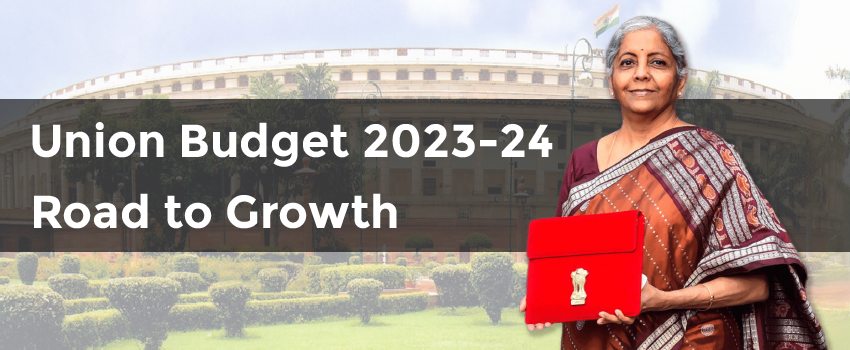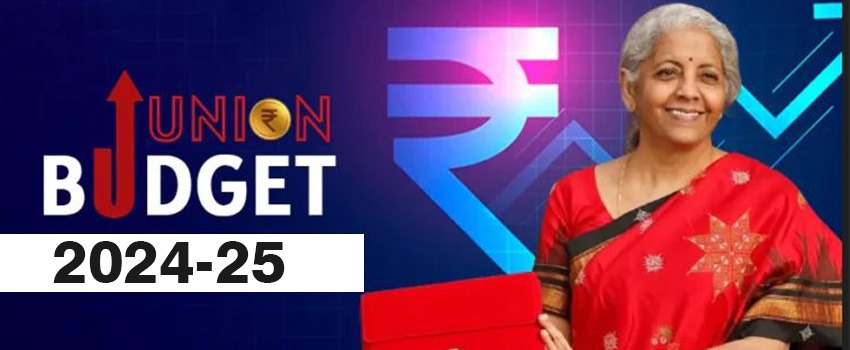Summary: The Budget for this year focused on Capex-led growth, improving the quality of government spending along with providing a prudent fiscal consolidation path. By reducing personal tax rates as well as surcharges on the super-rich, the budget aims at promoting consumption. This is central to the government’s efforts to enhance growth potential and job creation, crowding-in private investments, and ensure India’s growth despite global headwinds.
Key numbers from the budget speech:
- Significant increase in allocation for Capex towards infrastructure: Capital investment outlay is being increased steeply for the third year in a row by 33 % to Rs. 10 lakh Crore, which would be 3.3 % of GDP. This will be almost three times the outlay in 2019-20.
- The ‘Effective Capital Expenditure’ of the Centre is budgeted at 13.7 lakh crore, which will be 4.5 % of GDP.
- Railways: A capital outlay of 2.40 lakh crore has been provided for the Railways. This highest-ever outlay is about 9 times the outlay made in 2013-14.
- The outlay for PM Awas Yojana is being enhanced by 66% to over Rs. 79,000 crores. This higher allocation can trigger higher loan demand in the lower-income segment.
- Agriculture credit has been enhanced to Rs 20 trillion for the year 2023-24.
- The fiscal deficit is estimated to be 5.9% of GDP. The Government plans to continue the path of fiscal consolidation, targeting to reach a fiscal deficit below 4.5% by 2025-26 with a fairly steady decline over the period. To finance the fiscal deficit in 2023-24, the net market borrowings from dated securities are estimated at Rs. 11.8 lakh crore. The gross market borrowings are estimated at Rs. 15.4 lakh crore.
- Tax Rate Slab Changes: With the objective of giving relief to the middle class, the much-anticipated revision of Tax slabs happened in this budget. However, these changes were effective in the new tax regime which does not provide many of the deductions like 80C (Investments in ELSS/PPF/Term Insurance) & 80D (Medical Insurance) which were available in the old tax regime. FY 2023-24 onwards, an individual whose income is chargeable to tax under the New Tax Regime, shall now be entitled to a rebate of 100 % of the amount of income-tax payable on a total income not exceeding Rs. 7 lacks.

This provides us the view that the government is more focused on giving taxpayers the option to choose what to do with their savings rather than the government incentivising investment in some Tax saver products.
Highest surcharge rate is to be reduced from 37% to 25% in the new tax regime. This would result in a reduction of the maximum tax rate to 39% from the earlier 42.74% for individuals having yearly income of more than 5 Cr.
- As a result of these proposals, the total revenue forgone by the government is about Rs. 35,000 crore annually.
Industry-wise Impact of the Budget
Infrastructure:
The Government is focused on Infra, Inclusive development, and Green energy. Spending on infrastructure will have a multiplier effect on growth and job creation. The outlay for NHAI is increased by 21% to Rs. 1.62 Trillion for FY24. Enhancing opportunities for private investment in infrastructure will help expedite the execution of infrastructure creation. However, barring well-established companies, there aren’t much opportunities for direct stock picking in this sector. Thus, it is better to play the Infra theme by investing in an Infra-focused Mutual Fund.
Insurance:
Income from insurance policies (except on death) with an aggregate premium of more than Rs. 5 lahks per year (other than ULIP) is taxable from 1st April 2023 for new policies. This can potentially impact new policy sales for insurance companies and especially impact their endowment/moneyback products. This change has the maximum negative impact for companies focused on high-net-worth clients. Also, as the tax deduction is unavailable for such investment under the new tax regime which shall be the preferred choice hereon, selling Insurance as Tax saving products shall cease going forward.
Electronics:
The basic customs duty on parts of open cells of TV panels shall be reduced from 5.0% to 2.5%. Whereas Relief in customs duty on import of certain parts and inputs like camera lens for manufacturing of mobile phones from 2.5% to Nil shall be extended for another 1 year. This shall promote value addition in the manufacture of mobile phones and TVs.
Tobacco:
NCCD duty rate revised upwards by ~16%, which will lead to an effective price increase of about 2% against the expectation of a 10 -12% hike. This moderate increase in tax rate will not dent the demand environment for the cigarettes business which is one of the cash cow for ITC as it has significant pricing power in this segment.
Cement:
The budget was a continuation of past budgets in terms of increased allocation towards infrastructure (roads, railways, airports, etc.). Continued and improved thrust on infrastructure spends shall be Positive for the cement sector. Focus on housing with a large allocation towards the PM Awas Yojana will drive cement demand as housing drives ~60% of India’s cement demand. Watch out for upcoming notes on this theme.
What are some big ideas we are looking at?
- Over the next years, buoyant public and private capex keep us positive on the investment sectors such as capital goods, railways, cement, logistics & defence more than the discretionary segments.
- We are also positive on the agriculture space seeing the government’s focus on raising domestic production and eventually encouraging exports.
- The banking sector is another beneficiary that will enjoy growth as it will fund the value chain of infrastructure companies. Banks currently are well capitalised to fund new infrastructure projects backed with increased consumer savings.
Useful Links:
Undervalued Nifty 50 Mutual Fund Screener Stock Screener Alpha Cases 5 Stars Rated Stocks from Nifty 500 Business Houses Group
Need help on Investing? And more….Puchho Befikar
Why MoneyWorks4me | Call: 020 6725 8333 | Ebook | WhatsApp: 9860359463










